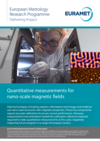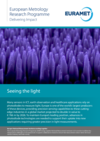Improved links to SI units for specific applications

Industrial production processes and manufacturing quality assessments rely on a rigorous calibration chain from the measurement instrumentation used to the top-level SI unit realisations performed at NMIs. Ensuring that this chain meets user requirements relies on measurement research to develop and expand existing capabilities to meet increasing and specific individual industrial accuracy demands.
Each specific manufacturing process has its own requirements, not all of which can be met by a single calibration to SI unit realisations. Components assembled into complex systems frequently must undergo acceptance testing to ensure manufacturing specifications have been met, and once assembled into systems or devices, the final product will perform as anticipated. Bespoke measurement instrumentation calibrations may be needed to meet the most exacting requirements of specific user communities.
EMRP research has supported projects that address:
- Increased precision for long distance surveying using GNSS (SIB60)
- Increased precision for angle measurements important in beamline research and also the automotive, aerospace and mechanical engineering industrial sectors (SIB58)
- Greater accuracy for high-frequency electric circuit performance determination (SIB62)
- Improved traceability for in-process moisture measurements of materials important for product quality (SIB64)
Quantitative measurements for nano-scale magnetic fields
High technologies including robotics, information technology and medicine use nano-scale structures with magnetic properties. These tiny components require accurate calibration to ensure correct performance. However, measurement instrumentation lacked the calibration reference materials required to make quantitative measurements at this scale, negatively impacting future progress in a range of European sectors.
Seeing the light
Many sensors in ICT, earth observation and healthcare applications rely on photodiodes to measure light. Europe is one of the world’s largest producers of these devices, providing precision sensing capabilities to these cuttingedge industries in a global market projected to double in value to € 766 m by 2026. To maintain Europe’s leading position, advances in photodiode technologies are needed to support their uptake into new applications requiring greater precision in light measurements.


